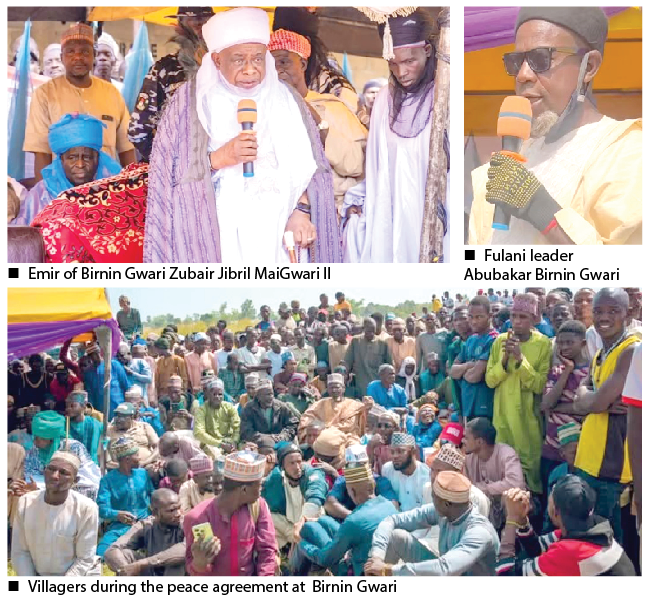Birnin Gwari, a town plagued by years of banditry, recently witnessed a significant development with a peace agreement signed between the government, security agencies, community leaders, and bandits’ leaders. This agreement has brought a mixture of excitement and cautious optimism among the residents.
For years, bandits have terrorised the town and its surrounding areas, resulting in numerous deaths, the destruction of farmlands, and the displacement of entire communities. Farming, the primary livelihood of the people, came to a halt as farmers were either killed or kidnapped while working on their land. Many were forced to farm only close to their homes to avoid danger. Additionally, hundreds of villagers remain in captivity, awaiting ransom payments for their release.
Terms of the Agreement
Part of the peace agreement stipulates that bandits can access local markets and primary healthcare centres without being challenged by local vigilantes or residents. They are also free to take their cattle to sell and do their businesses within the villages unchallenged.
- Traditional rulers advised to shun partisan politics
- Birnin Gwari peace deal: Residents excited, optimistic
They (bandits) are also expected to stop collecting levies, taxes or kidnapping residents for ransom or destroying their crops. Again, they are also expected to allow the displaced villagers to return to their homes without being attacked or killed in the process.
Residents react
A community leader in Kwasakwasa, Malam Abu, observed that peace has gradually returned to some communities, especially around Kwasakwasa, Old and New Kuyello.
“There is a peace agreement now, and the bandits are seen going about their normal businesses in the villages. I saw them here at Kwasakwasa going about their business without intimidation, but their animals are still destroying people’s farms.
“People are forced to harvest their crops halfway to prevent them from being destroyed by the bandits’ cattle.
“When complaints are made to the herders, they only partially address the issue. So, we hope this will be addressed soon for the peace to be sustained,” he said.
Malam Abu called for the release of the people abducted by the bandits even though he confirmed that some villagers were released without ransom payment.
Shagari, another Birnin Gwari resident, confirmed that people now work on their farms until nightfall without fear. “Now you see our people returning home from their farms at night without fear of being attacked or kidnapped. As we speak, the livestock market has reopened, and the Fulani are seen patronising the markets. We are happy with the development,” he said.
Shehu Abubakar, a resident of Mashigi under Kakangi Ward in Birnin Gwari, was among the displaced persons in the area. He said they are eager to return to their houses once they are sure the deal is sustained.
He said he resided in Mashigi before they were chased away by bandits and moved to Kasakaki. After two years, the bandits again chased them from the town.
“Now I’m in Kakangi, and with the peace agreement, we are optimistic things will return to normal so that we can all return to our homes because that has been our wish,” he said.
He also called for the deployment of security personnel around their villages despite the peace agreement, saying their presence is vital for the peace and development of their areas.
Alhaji Abubakar Birnin Gwari, a Fulani leader who was part of the peace agreement, expressed his support for the deal.
“I was born in Birnin Gwari and grew up here. What has been happening (banditry) is very unfortunate and we were not happy about it,” he said during Governor Uba Sani’s visit to receive the repentant bandits and reopen the Kara Livestock Market.
“Let me just plead with the governor to exercise more patience because very soon the whole problem will be tackled and peace will return to this area,” he added.
Challenges, concerns
Despite the peace agreement, some residents are sceptical due to past experiences with broken peace deals. They worry about the sincerity of the bandits and the potential impact on neighbouring communities that might not benefit from the agreement.
Ishaq Usman Kasai, Chairman of the Birnin Gwari-Niger Inter-Boundaries Communities Association, emphasised the need for a comprehensive peace plan that includes neighbouring states like Niger, Katsina, Zamfara, and Sokoto.
“There have been previous peace deals in Birnin Gwari communities and some parts of Katsina and Zamfara communities which failed in the past. But with the present peace talks involving Governor Sani, officials of the NSA, security agencies, community leaders, and the representatives of the bandits, we are hoping it will be sustained,” he said.
Kasai’s optimism is tempered by realism. “We are optimistic and prayerful for the peace deal to succeed. We hope all the parties involved in the deal will abide by the terms of the agreement. Let everyone be sincere because we don’t want the deal to collapse after a year or months as the previous deals.
“The peace deal had in attendance representatives of bandits’ leaders like Yellow Jamboros operating around Kaduna-Birnin Gwari highway, Kwaga, Gayam, Palwaya, and Doka.
“We are also urging the government to extend the peace talks to other states, not only Birnin Gwari Local Government Area or Kaduna State.
“What will bring lasting peace is for the peace agreement to cut across all affected states battling banditry,” he said.
Kasai also stressed the importance of rehabilitating repentant bandits and addressing the grievances of displaced villagers. He said, “We have lost over 100 communities sacked by bandits in Birnin Gwari alone. These villagers have been displaced, and so the government needs to find out what should be done to provide relief to the affected villagers.”
He also highlighted the villagers’ concerns about the bandits still being armed, saying: “The people are wondering what will happen to neighbouring communities outside Birnin Gwari. Would they be terrorised, or will they also benefit from the peace agreement?”
Government’s role
Meanwhile, Governor Sani has said he will be fair to all parties; farmers, herders, and traders to achieve lasting peace and development in the state.
He disclosed that the Kaduna State government, in collaboration with some federal agencies, established The Peace Dialogue Group, which has been engaging stakeholders tirelessly.
“Through numerous meetings and extensive discussions, we have built bridges of trust. Several senior bandit leaders have laid down their arms and embraced peace, along with their followers,” he said.
He added that these individuals are being enroled in a rehabilitation programme designed by the state government in partnership with the federal government.
The governor warned that the rehabilitation of repentant bandits is based on the principle of carrot and stick. ‘’While we welcome those who choose peace, we will not hesitate to take decisive action against anyone who continues to perpetuate violence,’’ he said.
Governor Sani also disclosed that his government is developing what he referred to as the ‘Kaduna Model,’ which is a ‘’comprehensive framework for sustainable peace and security.’’
“This model will include disarmament, demobilisation and reintegration, alongside investments in rural development and conflict resolution. It is a holistic approach that addresses both the symptoms and the root causes of insecurity,’’ he added.
The Emir of Birnin Gwari, Zubair Jibril MaiGwari II, welcomed the peace agreement, noting that it took six months to finalise. He expressed hope that the deal would extend to other parts of the state affected by banditry.
“Most of the bandits terrorising the area were born here, but due to some reasons, they decided to revolt against the people. I believe the bandits’ representatives were sincere with the peace deal due to their commitment to the meetings held to discuss the situation,” he said.
As the government and residents work towards a lasting peace, there is a cautious optimism that Birnin Gwari can rebuild and thrive once again. The reopening of markets and roads, and the gradual return of normalcy, symbolise the community’s resilience and hope for a peaceful future.

 Join Daily Trust WhatsApp Community For Quick Access To News and Happenings Around You.
Join Daily Trust WhatsApp Community For Quick Access To News and Happenings Around You.

